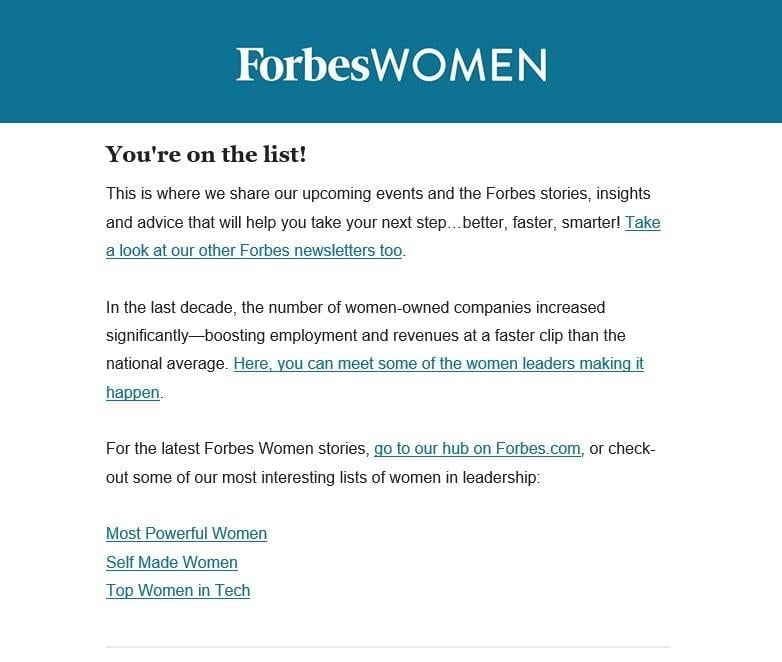20 Best Reasons For Choosing Email List Sellers
Wiki Article
What Factors Should I Think About When Purchasing The Hematologist Email List?
It's important to consider several aspects when purchasing the hematologist mailing list in order to ensure that the list you buy is accurate, compliant with law, and relevant to the marketing objectives. Here are the key considerations:1. Quality of data and accuracy
Source of data: Verify that the data provider is using trustworthy sources such as professional directories, databases or opt-ins from Hematologists. The accuracy of the information collected will determine the quality and reliability of the email list.
Verification of updates and data: Inquire about the verification of data process that your provider uses. Verify email addresses to get rid of invalid or inactive addresses. Regular updates are necessary to ensure that the list is accurate, as healthcare professionals may change positions or work in different institutions.
Segmentation by Specialization The list must be specific to the field of hematologists. If you can, divide the list further by subspecialty, location or years of experience, or affiliation with hospitals. The well-organized list can help you focus your outreach more effectively.
2. Compliance with Legal Regulations
Data Privacy Laws â Ensure that the list is compliant with applicable legislation and regulations such as California Consumer Privacy Acts in the U.S.A. or General Data Protection Regulations in Europe. It means that the email addresses should be collected only with the consent of the user.
CANSPAM Act: If you are in the U.S.A., make sure your list conforms with the CANSPAM Act, which governs all commercial email communications. Infractions could result in fines and your emails could be flagged for spam.
Opt-in Consent: The opt-in list should include hematologists who have explicitly consented to receive emails from third party. Unsolicited emailing to people who haven't consented can cause poor engagement as well as legal problems.
3. Provider Reputation
Reputable Provider: Check the reputation of the provider on the list. Reviews, testimonials, and case studies will help you decide if the company is well-known. A well-established supplier with a strong track record is more likely to provide high-quality, reliable data.
Transparency. Choose a service provider that's transparent about the method by which the data comes from. Companies that are unclear and unclear about how they gather data should be avoided.
Customer Support: Choosing an organization with excellent customer service is crucial. Support is crucial if you are having problems with your setup or technical configuration, need to customize your checklist or have compliance questions.
4. Cost and return on Investment (ROI).
Pricing Model: Be aware of the pricing method, whether it's pay-per-contact, flat-fee, or subscription-based. Be sure the price is in line with your potential return on investment, while balancing the quality of your list and quantity with the budget for your marketing.
Refund or Replacement Policy: A reliable supplier will offer a return or replacement policy in the event of invalid or out of date email addresses. Be sure to read the details of this policy before making an order.
Value for Money: Compare the features on the list, such as segmentation options and the provider's data accuracy guarantees, against the cost. If the quality of data in the list isn't good the list with the lowest price may not be the best option.
5. Data Ownership and Usage
Single Use Vs. Multiple Use: Be sure to read the conditions and terms prior to using the email list. It is possible to use the email list only for one campaign with certain companies, however others allow unlimited usage.
Exclusive vs. Shared Lists: Determine if the email list is only for your business or shared with other buyers. Exclusive lists usually have higher engagement rates as the list members are less likely to receive marketing emails from other sources.
6. Data Integration and Format
Compatibility: The email list must be compatible with email or CRM tools. The list must be in standard formats, such as CSV and Excel. This will allow for an easy integration.
User-friendliness: Consider how easy it is to filter and manage the list. Lists that are hard to manage or segment can hinder the effectiveness of your advertising campaigns.
7. Ethical Aspects
Relevance to Hematologists Make sure that your emails are appropriate to the field of hematology. Sending content to hematologists that doesn't align with their expertise will cause poor engagement and will affect the reputation of your brand.
Avoiding Spam Methods: Try not to flood the recipients with too many emails. Sending too many emails too often could result in spam complaints and damage to the reputation of your email sender.
We also have a conclusion.
It's crucial to think through the advantages and disadvantages of purchasing a list of hematologists. You should focus on the accuracy of data as well as the compliance with privacy regulations and the credibility of the company that offers the list to obtain a reliable and valuable list. The importance of segmentation, as well as the legal requirements and ethical marketing can allow you to maximize your return on investment and maintain your brand's reputation. View the top rated hematologists email list for blog tips.

What Are The Important Things I Should Be Thinking About Before Buying An Oncologist's List?
You should consider the following elements prior to purchasing an email list for your oncologist. These can assist you in making sure that the list you purchase is a good quality, targeted and legally in compliance. Here are the most important considerations to consider: 1. Data Quality and Accuracy
The source of data: Ensure that the data is coming from reliable and reputable sources like professional associations, medical directories or healthcare databases. Avoid lists that come from unreliable or unverified sources, as these may contain outdated or incorrect details.
Verification process: The list provider should have in place a robust validation process to ensure that the emails are legitimate, active and accurate. The list provider should periodically clean and update the list to remove inactive, incorrect, or duplicate contacts to ensure better deliverability rates.
Segmentation - A good email list for doctors should contain segmentation options. Being able to filter the list by subspecialties (e.g., pediatric oncology, surgical oncology, hematology-oncology), geographic location, years of experience, or institution allows for more targeted outreach, increasing the likelihood of engagement.
2. Legal Regulations
Data Privacy Regulations â Ensure that your email lists comply fully with all applicable laws. The General Data Protection Regulations, or GDPR which is in Europe; the California Consumer Privacy Act, or CCPA which is in the U.S.A. The email address must be gathered and processed in a legal manner and in a way that respects data privacy.
CAN SPAM Act Compliance: Make sure that all campaigns within the U.S. comply with the CAN SPAM Act, which regulates commercial email messages. You should include an opt-out option in your emails, and make sure your subject lines are accurate and be sure to not mislead your recipients. Infractions could lead to sanctions as well as damage to your brand.
Consent to Opt In: Check that all email addresses were acquired through consent. Oncologists should have agreed to receive emails from marketing companies in order to comply with privacy laws, and reduce the possibility of spam complaints or legal problems.
3. Provider Reputation
Reputable Supplier: It is crucial that you buy your lists from a business with a solid reputation on the market. Examine their credibility by looking up their credentials and looking up reviews, testimonials and case studies. Established providers have a higher chance of offering accurate and legally valid information.
Transparency: Providers must be transparent regarding how they source their data, the frequency at which it's updated and the verification methods employed. Insufficient transparency could be an indication that data is not up to standards.
Customer Support: Select the provider that offers prompt customer support should you have any concerns about the integration, segmentation or even compliance.
4. Cost and ROI
Knowing the price structure is important. It could be based on the number of contacts or a flat price. You should consider how the cost is in line with your marketing budget as well as expected return on investments (ROI).
Refund or Replacement Policy: A reputable supplier will provide a reimbursement or replacement policy in the event of invalid or obsolete email addresses that are not valid or outdated. To safeguard yourself, it is important to know the policies prior to buying.
Value for money: Don't rely solely on cost. A list with a lower price may be tempting but if it ends in a poor deliverability or a poor engagement, it can ultimately harm your campaign. Make sure the data you use is correct and pertinent.
5. Ownership, Usage and Access
Clear up whether you're using the list for one-time use or for ongoing use. Single-use lists might be less expensive, however should you be planning several campaigns, having the list can provide greater flexibility and long-term value.
Exclusive vs. shared lists. Find out if the lists are exclusive to you or if they're available to multiple buyers. Exclusive lists can be more valuable because they limit audience exhaustion, which leads to more engagement.
6. Data Integration and Format
CRM compatibility: Make sure that your list can be imported into your Customer Relationship Management (CRM), or email marketing tools. The list should be presented in a standard format, such as CSV or Excel to ensure seamless integration.
Easy segmentation: The CRM list should be easy to segment. Being able quickly filter using criteria such as oncology subspecialties or geographic location will help you tailor your campaigns to be more effective.
7. Ethical Besorgnization
Relevance of the message: Oncologists have demanding schedules and are highly-skilled professionals. Be sure that your message is pertinent to their job or interest for example, medical equipment, continuing education or pharmaceutical advancements. Unrelated emails could lead to a poor image of the brand and lower participation.
Avoiding Spam: Avoid over-emailing or sending unsolicited messages which could lead to spam complaints. Your audience should be contacted with a frequency that's sufficient to keep their attention without overburdening them.
We also have a conclusion.
When you purchase an oncologist mailing list, give priority to the accuracy of data, legal conformity, and the reputation of the vendor. The lists should be segmented to ensure they are tailored and validated for your specific audience. Think about these elements to design an effective and compliant outreach strategy. See the top oncologist email list for site info.
